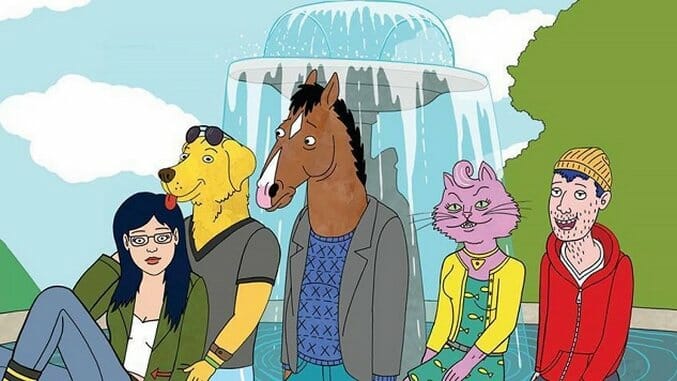6 Life Lessons We’ve Learned from BoJack Horseman

If one of the highest aims of art is to fully immerse its audience in a view on the world thoroughly different from one’s own, then Raphael Bob-Waksberg’s animated Netflix series BoJack Horseman counts as one of the finest recent examples of this potential. Not that you would necessarily have guessed it from its first few episodes, which used an Adult Swim-style aesthetic and Family Guy-like digressive humor for the sake of what initially seemed like just another showbiz satire about a washed-up, self-involved former star. And yet, as the first season went on and BoJack (voiced by Will Arnett) dove deeper into the mess that was his own troubled past and his current self-loathing present state, BoJack Horseman improbably gained in character depth and emotional heft even as it kept up its pitch-black humor and wall-to-wall visual comic grace notes. Even its satirical takedown of Hollywood sharpened in its second season: It’s one thing to hear about passion projects falling apart thanks to big-studio interference, but quite another to see it chronicled in as much detail as the series offered in its second year.
The result is a series that not only manages to generate sympathy toward a needy, depressive, narcissistic antihero, but also manages the rare but fascinating feat of making a bleakly misanthropic worldview seem like hard-earned wisdom. It doesn’t matter if you agree with that perspective; in the moment, at least, Bob-Waksberg & co. convince you that it’s imparting harsh life lessons. As we gear up for the third season of this great show, it’s worth taking stock of what BoJack Horseman has taught us so far.
1. Changing your attitude toward life is difficult.
Surely some of the most negative-thinking of us have been asked why we don’t just change our attitude toward life, as if positive thinking was so easy to adopt at the flip of a switch. BoJack Horseman shows us how difficult such a change can be in the first episode of the second season, “Brand New Couch,” in which BoJack, under the influence of a motivational tape, tries to become a more optimistic person basically overnight. That’s all well and good for BoJack, but it’s a tough pill to swallow for everyone around him used to his older self. There’s the rub in attempting such drastic personality switches, however good they may be for your well-being: the possibility that those around us may not be willing to accept the new “you” after all.
2. Character is destiny.

Perhaps, though, one’s inability to change one’s attitude overnight speaks to a larger truth: that, especially as you grow older, it becomes more difficult to change who you are as a person overall. “You’re BoJack Horseman. There’s no cure for that.” So says BoJack’s mother—seen previously in flashbacks as a petty and uncaring presence in his childhood—towards the end of “Brand New Couch.” But she’s not the only one positing this to him. When, in the first-season episode “The Telescope,” Herb Kazzaz, the former friend and Horsin’ Around creator he betrays, denies BoJack his attempt to put the past behind him, he leaves him with a similarly brutal assessment, calling him a selfish coward. BoJack Horseman is, to a considerable degree, about whether it’s at all possible to escape who you are—whether one can truly change and improve oneself. The second season ends on a rare note of optimism that leaves BoJack open to that possibility…but considering what he’s gone through in the first two seasons, one can’t help but fear an inevitable relapse.
3. Great art often truly is borne out of pain.
BoJack’s attempt to adopt a more upbeat attitude in “Brand New Couch” also seriously impacts his work on his passion project: a biopic about Secretariat. When he has to play a dark locker-room scene after Secretariat has just lost a major race, he finds himself unable to tap into his former reserves of melancholy, so obsessed is he in the moment with keeping up his happy-go-lucky demeanor. Only after he hears those lacerating words from his mother—thus bringing him crashing down to earth from his previous artificially optimistic state—is he finally able to nail the scene. Contained within that wounding moment is one of the most insightful depictions of what it takes to give a great performance, on a par with films like John Cassavetes’s Opening Night and, in its own extravagantly surreal way, David Lynch’s Inland Empire.
-

-

-

-

-

-

-

-

-

-

-

-

-

-

-

-

-

-

-

-

-

-

-

-

-

-

-

-

-

-

-

-

-

-

-

-

-

-

-

-













































